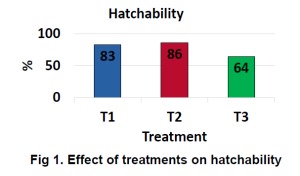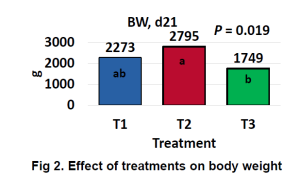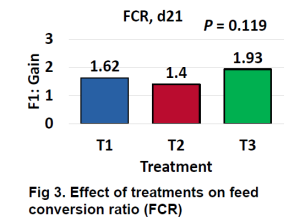Effect of storage time on hatchability rate and post-hatch growth performance of broiler chickens
Lauren Thompson* and Oscar Tejeda1
1 Faculty advisor
Physiological zero or storage of fertile eggs for long periods of time, decreases the survival rate of the chicken embryo the newly hatched chicks. Therefore, we conducted an experiment to better understand how different periods of physiological zero affect post-hatch growth performance. Eggs were separated into three treatment groups, namely: T1, eggs store for 4 days; T2, eggs stored for 8 days; T3, eggs stored for 12 days. All eggs were incubated for 21 days in the same incubator. Measurements of growth performance, feed intake and FCR were conducted on d7, d 14, and d21. Statistical analyses were conducted using SPSS version 21. T3 had the lowest body weight at the end of the experiment compared to T1 and T2 (P = 0.019). No statistical differences were observed in feed intake nor in FCR among treatments (P > 0.05). However, T3 had numerically higher FCR among treatments. These results indicated that eggs should not be stored longer than 8 days since long periods of storage linearly decrease the post-hatch growth performance of broiler chickens.
Key words: broiler chicken, storage time, post-hatch performance, growth
Data graphs



Questions?
Contact Dr. Oscar Tejeda
